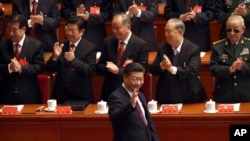From "princeling" to pauper to president, Chinese President Xi Jinping's reappointment to a second five-year term as Communist Party leader Wednesday caps a long, steady climb to power.
Born in 1953 to Xi Zhongxun, one of Communist China's founding fathers, the younger Xi was forced into hard labor in the remote village of Liangjiahe for seven years during the Cultural Revolution, after his father was purged from the party and imprisoned.
Xi survived the experience and entered Tsinghua University, where he earned a degree in chemical engineering in 1979. He then broke into the ranks of the ruling Communist Party, beginning as as deputy secretary in rural Hebei province before eventually rising to party chief in the economic hub of Shanghai.
His profile continued to rise after he was appointed in 2007 to the Politburo Standing Committee, China's top decision-making body, eventually becoming general secretary in 2012 and the nation's president a year later.
Under Xi's rule, China has taken a more assertive posture in both regional and world affairs, including an aggressive military build-up on uninhabited reefs and islands throughout the South China Sea, ignoring competing territorial claims made by its Asia-Pacific neighbors. He has also launched an aggressive campaign against official corruption, which has led to the punishment of more than one million Communist Party officials.
Observers say Xi has consolidated power by cultivating a cult of personality similar to that of Communist China founder Mao Zedong, while overseeing a growing crackdown on dissidents and human rights lawyers. His rise to power was cemented earlier this week when his name was enshrined in the Communist Party's constitution, alongside that of Mao and economic reformer Deng Xiaoping - meaning that any challenge to his rule could be seen as an act of treason.





